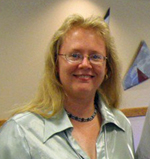by K. Kitts
 Writers who have been working the craft for a while understand the advantages of participating in a critique circle, but if you are new at this, you might need some convincing. First off, having external motivation especially if you write fiction on spec (i.e., you are not yet under contract) is important. There are no agents or editors beating down your door demanding to see that last chapter. The fear of disappointing your group will encourage you to turn off the TV before you get sucked into another rerun of Law & Order: Parking Division.
Writers who have been working the craft for a while understand the advantages of participating in a critique circle, but if you are new at this, you might need some convincing. First off, having external motivation especially if you write fiction on spec (i.e., you are not yet under contract) is important. There are no agents or editors beating down your door demanding to see that last chapter. The fear of disappointing your group will encourage you to turn off the TV before you get sucked into another rerun of Law & Order: Parking Division.
Critique circles are important not only to have someone read your work to find the plot holes and typos, but also to allow you to see in manifest example what to do and, occasionally, what not to do. It is difficult to see our own weaknesses, but it is rather easy to see these opportunities for improvement in others. Critiquing others’ work makes all of us better editors of our own writing.
Another important component of critique circles is old-fashioned camaraderie. Writing is a lonely business and it takes another writer to fully understand the emotional costs writing often exacts. Sometimes, you need a shoulder to cry on about that last rejection, or to whine about that unreasonable contract clause, or to receive moral support to get you back at the computer.
To develop a smooth running critique circle, there are several decisions that should be made up front before the recruiting process begins. Let’s review some of the major ones.
Number of Members
When starting a group, it is important to have enough people to elicit sufficient opinions and to keep the momentum going through vacations, sick kids, and due dates. However, the number of members should be evaluated against how much time the individuals have to dedicate to writing the reviews. If there are too many members, then the workload will interfere with your own writing and editing. Limiting the page count or alternating members can mitigate this difficulty, but do you really want to wait six months to get feedback on your limerick?
I suggest five or six and not more than seven or eight members. This allows for ten pages per person per meeting. Ten pages afford adequate advancement while protecting personal writing time.
Type of Group
Your next decision will be to determine whether the group will be genre-specific or general. Personally, I like mixed critique groups combining both fiction and nonfiction and expanding beyond my preferred genre. I find such reading more interesting. In addition, I learn tricks from genres I might not ordinarily read, and writers outside my area do not allow me to resort to shortcuts often tolerated within my fiction category. In other words, it makes my writing better. Do not fear critiquing a genre you do not generally read. Good writing is good writing. I do not need to be a thriller writer to identify problems in pacing or flat dialog.
Manuscript Length
Once you establish the make-up of your circle, you should also have an idea on manuscript length as you invite others to join you. Does the group prefer longer but fewer pieces at each meeting? Or fewer pages with each member giving and receiving critiques? Poems (unless epic), short stories, essays, magazine pieces are easy to schedule, but what of the novel? A three-hundred-page novel will take over a year at ten pages every two weeks. However, if a group of six agrees to cover one novel per month, everyone gets a review within those six months.
Group dynamics control this decision. I would simply warn you to be upfront with your expectations and to do the math. Also, be willing to revisit this issue regularly. It might not be prudent to wait five months for your turn and have the group dissolve as you send out your opus magnum.
Meeting Schedule
As for how often a group should meet, this depends on the will of the members and how far along the writers are. If most of the group have been writing for years, they will have a backlog of things to be critiqued and can have something ready to pass out weekly. A group of new authors might be in the middle of their first piece, and between work, the in-laws and the house-painting, have only enough time to produce ten pages every other week or even monthly.
The goals of the group and the type of work most members produce must also be balanced. If the group is made up entirely of screenwriters, critiquing a script per month is not unreasonable. If your critique circle is made up of Michener, King and two Russians named Tolstoy and Dostoyevsky, one novel per month will be too much.
Meeting Place
Some people prefer to meet in public places such as libraries or coffee shops. The advantages include not having to clean your house, and until you come to know the members in your group, not having strangers use your bathroom. The downsides include cost. You are expected to buy something at a restaurant and although libraries are free, many have eliminated their evening and weekend hours due to the economy. It may be impossible to schedule a convenient time for everyone. Again, poll your members. Allow the group to choose and revisit the decision from time to time.
Critique circles will assist you to stay on track by improving your craft, keeping you to deadlines and supporting you emotionally through that twenty-seventh rejection. As Ray Bradbury said in his collection of essays, Zen in the Art of Writing, “You must stay drunk on writing so reality cannot destroy you.”
 Dr. Kathy Kitts, past president of SouthWest Writers, is a retired geology professor who served as a team member on the NASA Discovery Mission Genesis. Despite having written dozens of scientific papers, school curricula and textbooks, she no longer writes about what is, but rather what if. Her recent fiction adventures include short literary fiction and speculative fiction in the Storyteller’s Anthology, James Gunn’s Ad Astra, and Mad Scientist Journal.
Dr. Kathy Kitts, past president of SouthWest Writers, is a retired geology professor who served as a team member on the NASA Discovery Mission Genesis. Despite having written dozens of scientific papers, school curricula and textbooks, she no longer writes about what is, but rather what if. Her recent fiction adventures include short literary fiction and speculative fiction in the Storyteller’s Anthology, James Gunn’s Ad Astra, and Mad Scientist Journal.
This article was originally published in the March 2012 issue of SouthWest Sage and is reprinted here by permission of the author.


[…] you’d like some pointers on starting your own critique circle, check out “Critique Circle Basics: Setting Up an Effective and Efficient Support Group” by K. […]